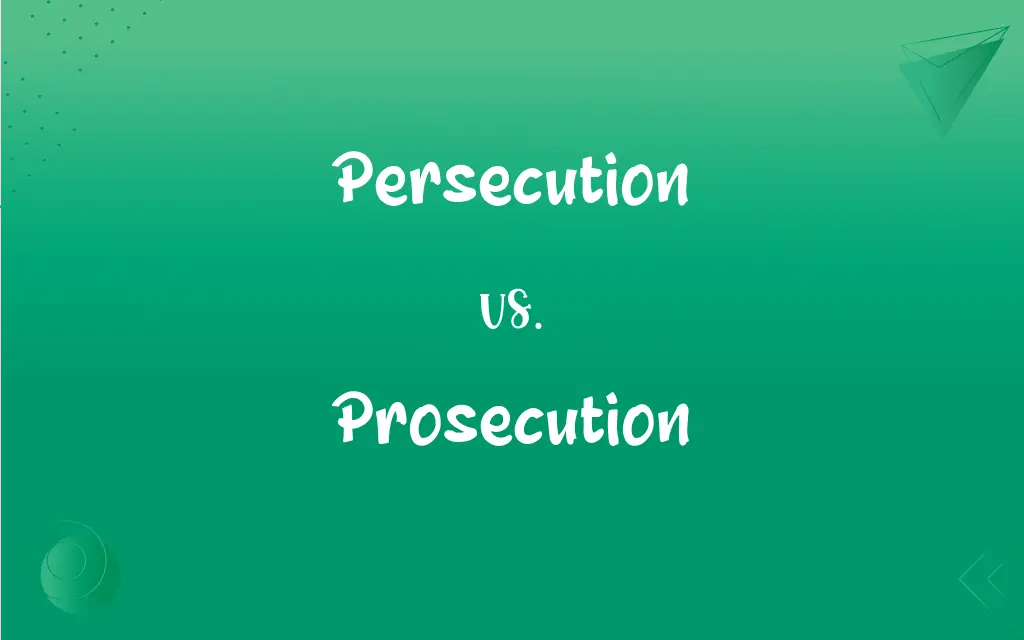Persecution vs. Prosecution: What's the Difference?
Edited by Aimie Carlson || By Janet White || Published on January 1, 2024
Persecution is the hostile and unfair treatment of a person or group, often for their beliefs. Prosecution is the legal process of charging and trying someone for a crime.

Key Differences
Persecution refers to the act of oppressing or harassing people, often based on their religious, ethnic, or social group. Prosecution, in contrast, involves the formal legal process where someone is accused and tried for criminal activity.
Persecution is rooted in discrimination and bias, leading to unjust treatment or abuse, while prosecution is part of the justice system, aiming to uphold law and order by legally addressing alleged crimes.
The motive behind persecution is often prejudice, targeting individuals for their identity or beliefs. Prosecution, however, is driven by the need to enforce legal statutes and is supposed to be free from personal or societal biases.
Victims of persecution suffer due to intolerance and hostility, which can lead to social, psychological, or physical harm. In prosecution, the accused face trial in a court of law, where their guilt or innocence is determined based on evidence.
Persecution can result in a range of human rights violations, including denial of freedom of expression. Prosecution, when conducted fairly, is a key component of the legal system ensuring justice and accountability.
ADVERTISEMENT
Comparison Chart
Definition
Hostile treatment based on beliefs or identity
Legal process of charging someone with a crime
Motivation
Prejudice, discrimination
Enforcement of legal statutes
Context
Social, religious, ethnic bias
Judicial system, court of law
Outcome
Abuse, denial of rights
Legal judgment of guilt or innocence
Role in Society
Violation of human rights
Upholding law and order
ADVERTISEMENT
Persecution and Prosecution Definitions
Persecution
Harassment or punishment for political or religious beliefs.
He faced persecution for his political views under the authoritarian regime.
Prosecution
Process of seeking formal charges and a conviction against a person.
The prosecution of corrupt officials was seen as a step towards justice.
Persecution
Persistent and oppressive behavior towards a particular group.
The persecution of the indigenous community was a dark chapter in the country's history.
Prosecution
The institution and carrying on of legal proceedings.
He faced prosecution for embezzlement of company funds.
Persecution
Inflicting suffering or hardship, typically because of difference or non-conformity.
She documented the persecution of dissidents in her journalism.
Prosecution
The party conducting legal action in criminal proceedings.
The prosecution argued that the evidence was irrefutable.
Persecution
Systematic mistreatment of an individual or group by another group.
The persecution of minorities in the region has drawn international condemnation.
Prosecution
Legal proceedings against a person accused of a crime.
The prosecution presented compelling evidence against the defendant.
Persecution
Unfair and cruel treatment, especially over a long period.
Historically, many have fled their homelands due to religious persecution.
Prosecution
The act of conducting a legal case against someone in a court of law.
The prosecution of the high-profile case garnered much media attention.
Persecution
The act or practice of persecuting on the basis of race, religion, gender, sexual orientation, or beliefs that differ from those of the persecutor.
Prosecution
The act of prosecuting.
Persecution
The condition of being persecuted.
Prosecution
The institution and conduct of a legal proceeding
Risked prosecution by breaking the law.
Persecution
The act of persecuting.
Prosecution
See prosecuting attorney.
Persecution
A program or campaign to subjugate or eliminate a specific group of people, often based on race, religion, sexuality, or social beliefs.
Prosecution
The act of prosecuting a scheme or endeavor.
The prosecution of the war fell to Winston Churchill.
Persecution
The act or practice of persecuting; especially, the infliction of loss, pain, or death for adherence to a particular creed or mode of worship.
Persecution produces no sincere conviction.
Prosecution
(legal) The institution of legal proceedings (particularly criminal) against a person.
Persecution
The state or condition of being persecuted.
Prosecution
(legal) The prosecuting party.
Persecution
A carrying on; prosecution.
Prosecution
(legal) In many countries, a legal body and institution, usually part of the state apparatus, empowered to perform prosecution. Prosecutor's Office. See Prosecutor.
Persecution
The act of persecuting (especially on the basis of race or religion)
Prosecution
The act or process of prosecuting, or of endeavoring to gain or accomplish something; pursuit by efforts of body or mind; as, the prosecution of a scheme, plan, design, or undertaking; the prosecution of war.
Keeping a sharp eye on her domestics . . . in prosecution of their various duties.
Prosecution
The institution and carrying on of a suit in a court of law or equity, to obtain some right, or to redress and punish some wrong; the carrying on of a judicial proceeding in behalf of a complaining party, as distinguished from defense.
Prosecution
The institution and conduct of legal proceedings against a defendant for criminal behavior
Prosecution
The lawyers acting for the state to put the case against the defendant
Prosecution
The continuance of something begun with a view to its completion
FAQs
Does persecution always involve violence?
Not always, it can be psychological or social.
What constitutes persecution?
Persistent unfair treatment, often for beliefs or identity.
Can persecution be legal?
It's generally considered a violation of human rights.
What is the goal of prosecution?
To legally establish guilt or innocence.
Can someone be persecuted for any belief?
Persecution often targets specific beliefs or identities.
Who carries out prosecution?
Typically, a government attorney or prosecutor.
Are persecution victims always minorities?
Often, but not exclusively so.
Is religious persecution common?
Yes, in many parts of the world.
What's the importance of a fair prosecution?
It upholds justice and legal integrity.
Is prosecution always criminal?
Yes, it pertains to criminal charges.
What is the role of evidence in prosecution?
Crucial for proving guilt beyond a reasonable doubt.
How is a prosecutor different from a persecutor?
A prosecutor is a legal official; a persecutor oppresses unjustly.
How does persecution affect societies?
It can lead to divisions, fear, and conflict.
Can persecution lead to asylum claims?
Yes, if it poses a threat to life or freedom.
Can persecution be state-sponsored?
Yes, in some regimes.
Can historical events be seen as persecution?
Yes, like genocides or witch hunts.
What are the standards for a fair prosecution?
Adherence to legal procedures and evidence-based trials.
What happens if a prosecution fails?
The accused may be acquitted or a retrial may be sought.
Does prosecution require a lawyer?
Legal representation is typically necessary.
Is wrongful prosecution a concern?
Yes, it's a serious issue in the justice system.
About Author
Written by
Janet WhiteJanet White has been an esteemed writer and blogger for Difference Wiki. Holding a Master's degree in Science and Medical Journalism from the prestigious Boston University, she has consistently demonstrated her expertise and passion for her field. When she's not immersed in her work, Janet relishes her time exercising, delving into a good book, and cherishing moments with friends and family.
Edited by
Aimie CarlsonAimie Carlson, holding a master's degree in English literature, is a fervent English language enthusiast. She lends her writing talents to Difference Wiki, a prominent website that specializes in comparisons, offering readers insightful analyses that both captivate and inform.
































































